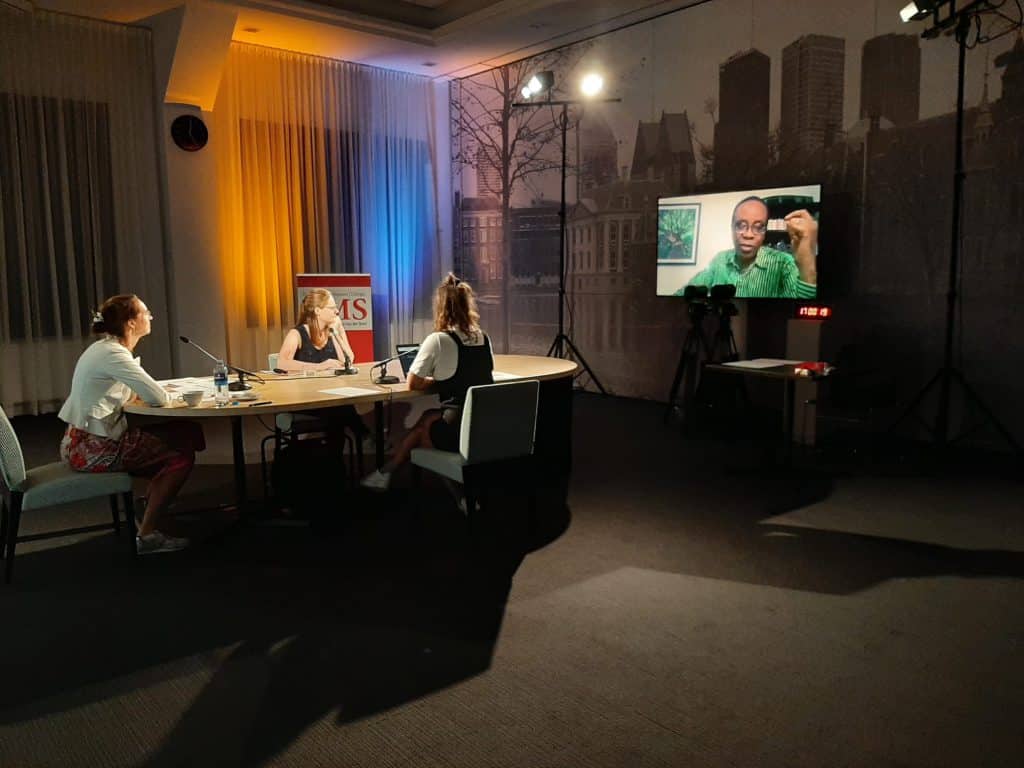The issue of climate change dominates the news and our minds. The IPCC Report that was released in August was clear and alarming: Climate change is here, and it’s here to stay if we do not take comprehensive collective action. However, although the news of climate change now slowly gathers more attention, one side of the story is continuously missing: the voices of the people most vulnerable to climate change.
To counteract this disappointing trend, last week, FEPS and FMS organised three different sessions on the issue of climate justice, which is a principle that addresses the solutions to climate change as a people-centred, ethical and political matter, rather than a purely environmental and physical issue. A climate-just solution ensures that people that are hit hardest by climate change, are compensated the most, leading to a more equal distribution of wealth, power and access to decision-making. The first two sessions introduced two different parts of climate justice: The first addressed why it’s essential to consider the gender dimension in the discussion as well, while the second addressed the issue of (unjust) climate finance. This all came together in our last session on Thursday: FEPS and FMS officially launched their policy study: Climate Justice: African Perspectives & EU Policies.
Launch of Climate Justice: African Perspectives & EU Policies
This official launch was the culmination of two years of research and intensive cooperation with Africans to arrive at several policy recommendations, meant to improve incorporation of African perspectives. The session made for an enlightening afternoon, with insights from policymakers, Joris Thijssen from the Dutch Labour Party PvdA, and Maria Arena, Member of the European Parliament for the S&D Group, as well as African experts, Mishy Singano, Head of Programmes at FEMNET and Nnimmo Bassey, Director at Health of Mother Earth Foundation.
This was a very fruitful discussion, with insightful takes from our African experts, that echoed the statements of the other two sessions. For example, Mishy Singano argued that “we need to move past African women as a case study, but engage them as equal partners in the discussion.” Joris Thijssen and Maria Arena were open to the suggestions of our African experts, with Maria Arena arguing that “we need to do more than just giving African a voice, we need to build something with Africa.” Nnimmo Bassey corroborated this statement, by adding that just listening isn’t enough: It is time for action: “What we need today is not net zero, but real zero emissions. We cannot continue business as usual, that will only delay climate action.”
Climate Justice: The Gender Dimension
Earlier that week, another session was organised by our partner Women Engage for a Common Future (WECF), an ecofeminist network dedicated to a gender-just and healthy planet for all. We were joined by Agnes Mirembe, the executive director of Action for Rural Women’s Empowerment (ARUWE), an organisation based in Uganda. Agnes explained why it’s imperative that we also take the gender dimension into account when discussing climate change. She showed how women are affected more harshly by climate change, because they often bear the brunt of the agricultural work, which is often destroyed because of climate change-related natural disasters. In addition, they also have limited access to information and economic resources, increasing their vulnerability in case of a climate change-related incident.
Agnes showed us how ARUWE counteracts these two issues: They provide women with agricultural trainings, teaching them to maximise available land and introducing them to renewable energy solutions. In addition, by focusing on capacity-building, ARUWE also helps them organise and mobilise themselves, so that these women not only have the means to represent themselves, but also their entire community.
Climate Justice: Fair Climate Finance
The second session was organised by Cordaid, and we were joined by two of their staff members: Margot Loof and Enkas Chau, who joined us from Sudan. This session mainly addressed the unequal distribution of climate finance. Climate finance is finance that is either meant to prevent communities from being exposed to the consequences of climate change, or to help them adapt to these consequences. Unfortunately, in climate finance, mitigation is often prioritised over adaptation, which means that the adaptation of communities to the direct effects of climate change is lagging behind.
In addition, local communities often have a hard time applying for climate finance, because they lack the information and means to reach these channels. To counteract this, Cordaid finances multiple projects meant to alleviate the risks posed by climate change. For example, they train women how to produce clean stoves, to reduce carbon emissions, and they introduced solar irrigation for agriculture to communities. However, Cordaid cannot do this alone: Climate finance needs to be available for local communities as well, since these are hit hardest by climate change, and thus know what solutions would fit best.
A call for action: “Fight like hell for the planet”
These sessions have made it very clear that the effects of climate change on the African continent are real, and they’re harsh. When Joris Thijssen was asked what we need to do now, he responded with a firm “Fight. Fight like hell for the planet.” We will join him in this call for action, but we will also stress that this publication is, above all, a plea to start including African voices in all steps of drafting and implementing climate change policy. It is time to listen to their voices, to ensure a more climate-just future.
To read our complete policy study, click here.
To (re)watch the official launch, click here.
De Nederlandse samenvatting lezen? Dat kan hier!





